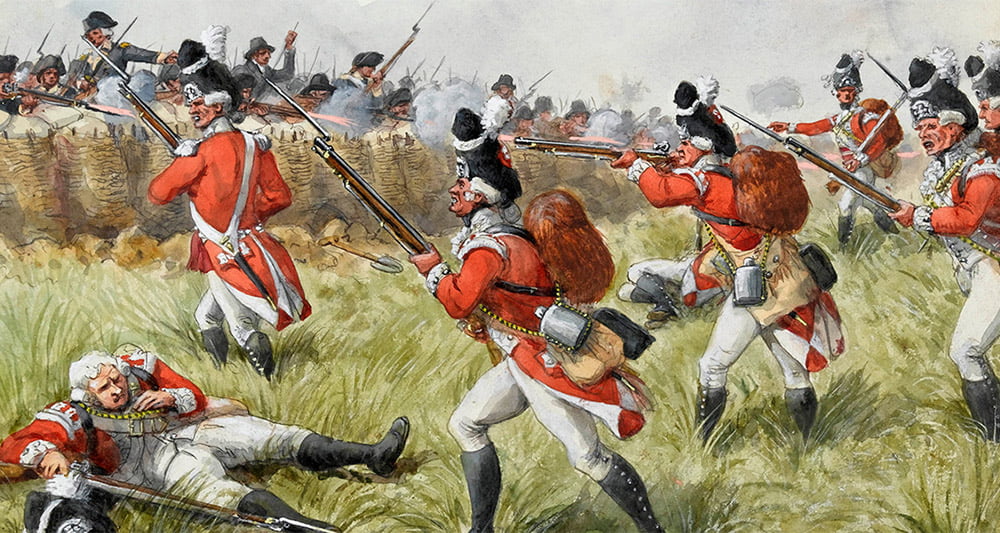Top 10 Epic British Battle Hymns That Stirred Nations

British battle hymns, also known as patriotic songs or war hymns, have played a significant role in the country’s history. During times of conflict, these historical hymns have rallied soldiers and civilians, celebrated victories, and expressed national pride. The stirring melodies and evocative lyrics of battle songs have inspired generations of Britons, making them a crucial part of the nation’s cultural heritage.
Uniting a Nation: The Role of Historical Hymns in British Culture
During times of war, troops used British battle hymns to boost morale and remind themselves of their duty to their country. The songs often celebrated military heroes and their bravery, while also emphasizing the importance of unity and national pride. These historical hymns became a symbol of British identity and helped to create a sense of camaraderie among soldiers and civilians alike.
Are you curious to discover the top 10 British Battle Hymns that stirred nations throughout history? From ancient chants to modern anthems, explore the rich tradition of British patriotic music and the powerful impact it had on soldiers and civilians alike.
- “Rule, Britannia!” (War of the Spanish Succession, 1701-1714)
- “The British Grenadiers” (Various wars, 18th and 19th centuries)
- “Hearts of Oak” (Seven Years’ War, 1756-1763)
- “The Minstrel Boy” (Crimean War, 1853-1856)
- “Jerusalem” (World War I, 1914-1918)
- “Pack Up Your Troubles in Your Old Kit Bag” (World War I)
- “We’ll Meet Again” (World War II, 1939-1945)
- “The White Cliffs of Dover” (World War II)
- “Land of Hope and Glory” (World War II)
- “Abide with Me” (World War I and II)
1 “Rule, Britannia!” (War of the Spanish Succession, 1701-1714)
James Thomson wrote the lyrics for “Rule, Britannia!” while Thomas Arne composed the music. Linked with the War of the Spanish Succession (1701-1714), “Rule, Britannia!” is one of the most famous British battle hymns and a British patriotic song. The song’s lyrics express British pride and maritime dominance.
During the war, British troops used “Rule, Britannia!” as a rallying cry, and it was performed at military ceremonies. It stirred up a sense of national pride and unity and boosted morale on the battlefield. This historical hymn is a significant moment in British history, marking the beginning of Britain’s naval dominance in the world.
The hymn had a profound impact on soldiers, instilling courage and determination in them. The powerful and uplifting melody of “Rule, Britannia!” served as a reminder of the strength and unity of the British nation, inspiring soldiers to fight for their country. British war hymns and patriotic songs like this have an enduring power to motivate soldiers.
“Rule, Britannia!” is an emblematic symbol of British pride and unity. It represents the power of British patriotic songs and battle hymns. Its historical value, stirring melody, and evocative lyrics have made it one of the most enduring historical hymns ever created.
2 “The British Grenadiers” (Various wars, 18th and 19th centuries)
“The British Grenadiers” is a British marching song that was popular during various wars in the 18th and 19th centuries. It inspired troops during times of conflict. It is one of the most iconic British battle hymns, symbolizing British pride and unity for centuries. Its stirring melody and evocative lyrics boosted morale and uplifted soldiers during difficult times. Anonymous composers wrote this song. Its enduring popularity is a testament to the power of British patriotic songs and battle hymns.
During the American Revolutionary War, the Napoleonic Wars, and the Boer War, “The British Grenadiers” motivated soldiers. Its rousing melody and lyrics reminded soldiers of their duty to their country and helped boost their fighting spirit. This battle song also marched during parades and military ceremonies, cementing its status as one of the most beloved historical hymns.
The hymn’s powerful impact on soldiers during tough times helped shape British military history. It was a symbol of British patriotism, unity, and courage that soldiers carried with them to the battlefield. “The British Grenadiers” continues to be a significant British battle hymn and a testament to the enduring power of historical hymns in lifting the spirits of troops during difficult times.
3 “Hearts of Oak” (Seven Years’ War, 1756-1763)
“Hearts of Oak” is a British patriotic song that originated during the Seven Years’ War from 1756 to 1763. The song became one of the most famous British war hymns and was used to boost the morale of troops during times of conflict.
This historical hymn was written by the English playwright and poet David Garrick. He was a staunch supporter of the British military. “Hearts of Oak” became a symbol of British pride and determination with its inspiring melody and powerful lyrics. It stirred the hearts of soldiers and civilians alike. During the American Revolutionary War, the song was used to rally British troops, becoming a rallying cry for them on the battlefield.
The impact of “Hearts of Oak” on soldiers during times of war cannot be overstated. The song’s powerful lyrics helped instill a sense of patriotism and duty in soldiers. They were reminded of the importance of their service to their country. The rousing melody served to uplift the spirits of soldiers. It provided a much-needed boost of morale during difficult times.
Overall, “Hearts of Oak” is a timeless example of the power of British patriotic songs, battle hymns, and historical hymns to stir the hearts and minds of a nation during times of war. Its historical value as a symbol of British pride and unity is a testament to the enduring legacy of the song. It also shows the impact it had on the soldiers who fought for their country.
4 “The Minstrel Boy” (Crimean War, 1853-1856)
“The Minstrel Boy” is a historical hymn from Ireland, popular during the Crimean War. It shows the power of British patriotic songs to inspire soldiers in times of conflict. Thomas Moore, an Irish poet, wrote the lyrics, making it an iconic piece of British war hymns.
During the war, “The Minstrel Boy” symbolized British courage and determination. Its haunting melody and poignant lyrics served as a reminder of the soldiers’ sacrifices. It provided comfort and inspiration to the soldiers during difficult times, and its message resonated with civilians.
“The Minstrel Boy” stirs the emotions of the nation during times of war. Its rousing melody and inspiring lyrics instill patriotism and duty in all who hear it. As a symbol of British pride and unity, it had an enduring impact on soldiers. Overall, “The Minstrel Boy” is a shining example of the power of British battle hymns. Its historical significance, combined with its message of courage and resilience, makes it a beloved historical hymn.
5 “Jerusalem” (World War I, 1914-1918)
“Jerusalem” is a historical hymn that was written by William Blake in 1804. The song gained immense popularity during World War I from 1914 to 1918 and became a symbol of British patriotism and unity. This song is an exemplary piece of British patriotic songs, and it is still sung at various events in the UK.
The hymn’s historical value lies in its ability to stir the emotions of the nation during the First World War. Its powerful lyrics and stirring melody made it a rallying cry for the British people, who were fighting for their country. The hymn’s popularity during the war was such that it became a symbol of British determination and courage.
“Jerusalem” had a significant impact on the soldiers who fought in the war. Its inspiring lyrics and rousing melody provided them with a sense of hope and inspiration during times of conflict. The hymn’s message of courage in the face of adversity and the need to stand up for one’s country resonated with soldiers and civilians alike, making it one of the most beloved British war hymns of all time.
The hymn’s importance extends beyond its historical significance as a symbol of British pride and unity. It remains a powerful reminder of the enduring legacy of British battle hymns, historical hymns, and battle songs. Its message of hope and determination is as relevant today as it was during the First World War.
“Jerusalem” is a shining example of the power of British patriotic songs, British battle hymns, and historical hymns to stir the hearts and minds of a nation during times of war. Its impact on soldiers and civilians alike is a testament to the enduring legacy of this iconic piece of music. The hymn continues to inspire people around the world with its message of hope, courage, and determination.
6 “Pack Up Your Troubles in Your Old Kit Bag” (World War I)
“Pack Up Your Troubles in Your Old Kit Bag” is a beloved British song that originated during World War I. The song, which was written by George Asaf and Felix Powell, served as a morale booster for soldiers on the front lines. The historical value of “Pack Up Your Troubles in Your Old Kit Bag” is its ability to uplift the spirits of soldiers. The song’s catchy melody and upbeat lyrics instilled a sense of optimism in soldiers during the war.
As a battle song, “Pack Up Your Troubles in Your Old Kit Bag” became a symbol of British patriotism and determination in the face of adversity. Its popularity quickly spread throughout the nation, with civilians and soldiers alike singing its inspiring lyrics and catchy tune.
The impact of “Pack Up Your Troubles in Your Old Kit Bag” on soldiers cannot be overstated. The song provided soldiers with a much-needed sense of comfort and support during difficult times in their lives. Its uplifting message encouraged soldiers to keep fighting, even in the darkest of moments.
“Pack Up Your Troubles in Your Old Kit Bag” is a shining example of British war hymns’ power. It inspires and motivates soldiers during times of conflict. Its legacy as a symbol of British pride and resilience continues to inspire new generations. It’s one of the most beloved battle songs of all time.
7 “We’ll Meet Again” (World War II, 1939-1945)
“We’ll Meet Again” is a British patriotic song that gained popularity during World War II. Ross Parker and Hughie Charles wrote the anthem, inspiring soldiers fighting on the front lines. “We’ll Meet Again” is historically valuable for its ability to uplift the spirits of a nation facing war. The song’s message of hope and perseverance resonated with civilians and soldiers alike.
“We’ll Meet Again” had a profound impact on soldiers and civilians. Its inspiring lyrics and rousing melody served as a reminder of the importance of unity and resilience in the face of adversity. The hymn’s enduring legacy inspires new generations, making it one of the most beloved historical hymns.
The hymn is a brilliant example of British patriotic songs and historical hymns during times of war. It inspires hope and resilience in the face of adversity and resonates with people today. It is one of the most cherished battle songs in British history.
8 “The White Cliffs of Dover” (World War II)
“The White Cliffs of Dover” is a timeless classic synonymous with British patriotism during WWII. It was written by Walter Kent and Nat Burton. The historical hymn’s poignant lyrics and uplifting melody stirred the nation and reminded them of the beauty and strength of their country.
As one of the most beloved British patriotic songs, it boosted morale and inspired hope during the war. Its imagery and memorable chorus created a sense of unity and determination, propelling the nation to victory.
For soldiers, the song was a powerful reminder of the home they were fighting to protect. Its lyrics gave them the strength to keep fighting. “The White Cliffs of Dover” remains an enduring symbol of British resilience and pride, and one of the most cherished battle songs of the war. Its message of hope and unity continues to resonate with people around the world. This makes it one of the most cherished and beloved historical hymns of all time.
9 “Land of Hope and Glory” (World War II)
“Land of Hope and Glory” is a timeless classic that became a symbol of British patriotism during World War II. Written by Edward Elgar, this historical hymn stirred the nation with its powerful message of hope and pride. As one of the most beloved British patriotic songs of all time, “Land of Hope and Glory” played a vital role in boosting morale and inspiring hope during the war.
The hymn’s rousing melody and inspiring lyrics helped create a sense of unity and determination. It gave soldiers and civilians alike the strength to persevere through the darkest days of the war. The hymn’s powerful message of British pride and resilience resonated with the nation. It became one of the most cherished historical hymns of all time.
For soldiers fighting on the front lines, “Land of Hope and Glory” served as a powerful reminder of the home they were fighting to protect. Its lyrics speak of a land of freedom and beauty, which gave them the courage to keep fighting, even in the face of unimaginable adversity. The hymn became one of the most cherished battle songs of the war. It remains an enduring symbol of British resilience and pride to this day.
“Land of Hope and Glory” is an excellent example of a historical British battle hymn. It has the power to stir the hearts and minds of a nation during times of war. Its ability to inspire hope and resilience in the face of adversity continues to resonate with people today. The hymn is one of the most beloved British war hymns of all time. In short, the hymn’s impact on the nation and soldiers during the war was profound. It remains a testament to the enduring power of battle songs and historical hymns.
10 “Abide with Me” (World War I and II)
The British patriotic song, “Abide with Me,” written by Henry Lyte, gained significance during both World War I and II. This historical hymn stirred the nation with its inspiring message of hope and perseverance. The hymn’s value was immeasurable as it helped to uplift the spirits of soldiers and civilians alike during the darkest days of the war.
As one of the most cherished British war hymns, “Abide with Me” became a symbol of British resilience and pride. Its powerful message of divine comfort and support brought comfort to soldiers fighting on the front lines. This historical hymn also became a reminder of the sacrifices made by British soldiers during the war, highlighting the bravery and dedication of the nation’s military.
Among the many British battle hymns and historical hymns, “Abide with Me” stands out as an enduring testament to the power of music in times of war. The hymn’s impact on the nation was profound, providing a sense of unity and determination that helped to carry the country through the most challenging periods of the war.
In conclusion, “Abide with Me” played a vital role as one of the most beloved British war hymns and historical hymns of all time. Its inspiring message of hope and perseverance, combined with its stirring melody, helped to uplift the spirits of soldiers and civilians alike, becoming an enduring symbol of British pride and resilience.












